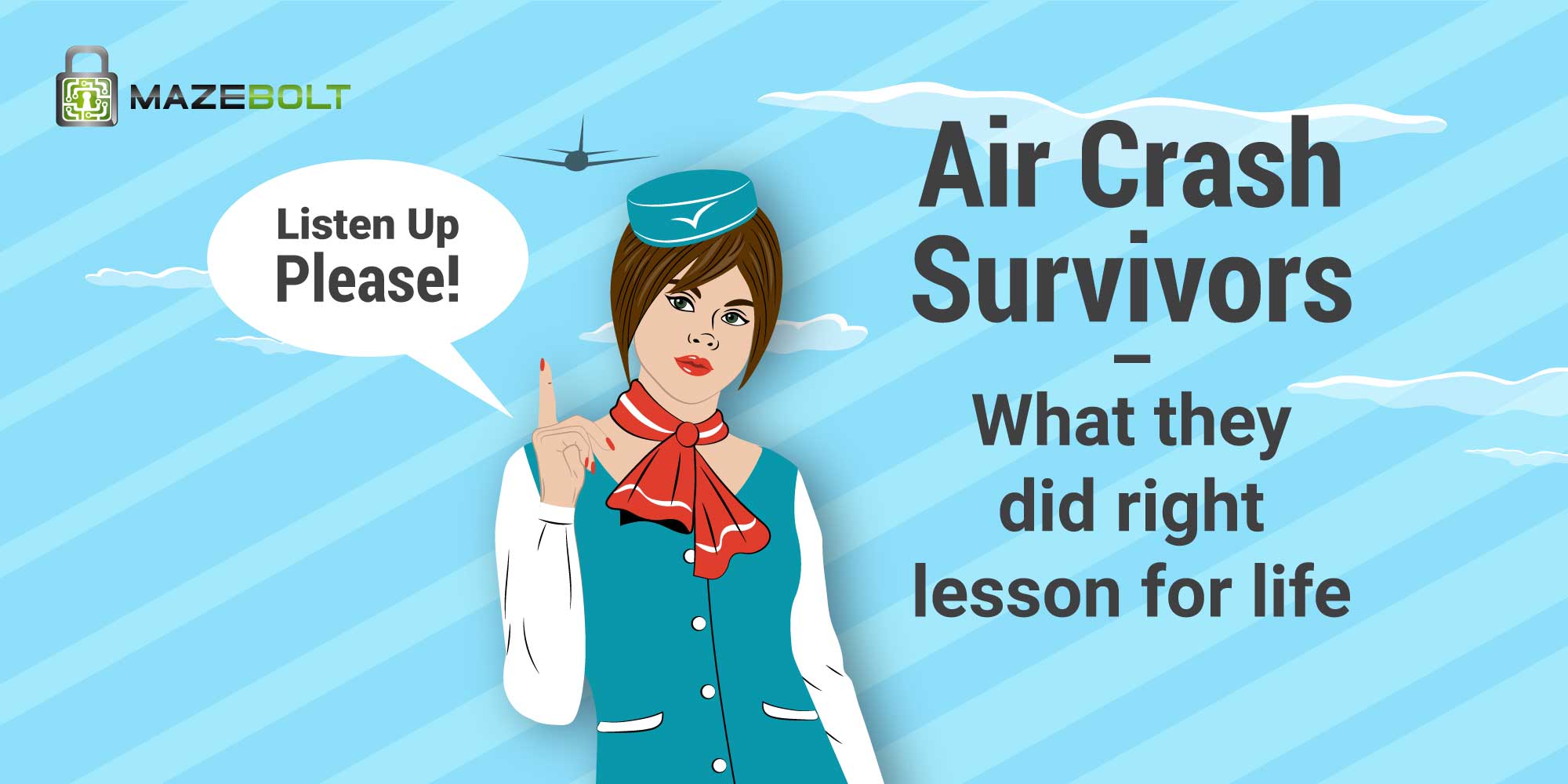An article in The Guardian about air crash survivors caught my attention. I have always been fascinated by planes and there is not a single flight journey where I have not looked out of the small window and wondered what would happen if my plane crashed. Talking to friends and others, we all seem to have that thought crossing our minds when we fly. Even if we want to forget, the air staff make sure we won’t, when they talk about oxygen masks and life vests. They drive home the stock reality that an accident can happen and when it does, none of us will actually be prepared for it. However, it is human nature to remain complacent and assume that we will be the exception to the rule. We like to see ourselves as invincible. Sometimes we can take comfort in numbers. For example, in a report analyzing airline accidents from 1983 to 2000, the National Transportation Safety Board found that the survival rate of crashes was 95.7%. And, even though 40 percent of passengers report fear of being involved in a plane crash, the actual chance of dying in one is roughly one in 5 million — and that’s at the high end. By comparison, an average person’s chances of dying by simply walking down the street is about 1 in 500.
So what did these people do right that saved them?
The first thing that struck me was the lucidity with which they narrate their experiences and the clarity they seem to have experienced in the face of a crisis. Josh Peltz, a survivor of the US Airways flight 1549 that crashed into the Hudson River, New York, says that he read the flight safety manual, even as the plane came tumbling down at the speed of 180 miles per hour. He says, “At about 300ft, I started reading the instructions. There were six steps, and I read them two or three times, testing myself on each step and trying to envision myself opening the door. We were headed for the water fast. I cinched my seat belt tighter and tighter, and balled myself up over my overcoat”. The plane crashed and his fellow passenger was trying to pull the door in. But Josh knew that the door had to be pushed outwards to open it.
Another survivor remembered to tie his shoelaces and carefully placed his reading glasses in his pocket. Another survivor says she felt calm and determined, seconds after the crash. As one reads on about their experiences, certain personality characteristics emerge and these are the traits of survivors. Some of these are the ability to plan even in the face of a crisis, being able to stay calm and not panicking, and ensuring that they are equipped with the knowledge to handle the crisis. They are also conscious of the benefits of staying safe, i.e. which seat to choose and whether it is closest to the exit and so forth. These lessons are life lessons and are not just limited to crisis situations.
Here are a few key takeaways:
- Be realistic – The lesson learnt is, don’t plan to die as long as there is life in you.
- Don’t lose sight of what is most important – When the crash happens, and you are still breathing you are a survivor. Find a way out.
- Be knowledgeable – You might have heard these instructions many times but still, listen to the instructions given by the staff and follow them.
- Practice social responsibility – They have all tried to help others to save themselves.
- Keep your shoes on – If there is a crash and you have to find your way out, you can hurt yourself badly, trampling on debris.
- Plan ahead – Numbers matter, and preparing yourself for a plane crash might seem extreme, but in life we experience mini-plane crashes all the time. For businesses, the same truth holds good.
In recent times, Covid-19 has shaken the lives of people and businesses across the globe. What if instructions can be followed, i.e. social distancing, and wearing masks, can the pandemic be controlled? For businesses, the need to support remote staff, and ensure operational efficiency while depending on vulnerable VPNs is the crisis situation. There are also continuous ominous-sounding stories of cyber crimes and DDoS attacks. Is there a way to plan and mitigate these challenges? From the lessons of plane crash survivors, it is important to equip oneself with knowledge, remain calm and take the right steps.
About MazeBolt
Israel-based MazeBolt is an innovation leader in cybersecurity, with over two decades of experience in pioneering DDoS protection solutions. The company’s new flagship product, RADAR™, is a patented, new technology. It offers DDoS protection through automated DDoS simulations on live production, with zero downtime. Working in conjunction with any mitigation solution installed. Its unique capabilities have ensured business continuity and full DDoS security posture for enterprises worldwide including Fortune 1000 & NASDAQ-listed companies.






